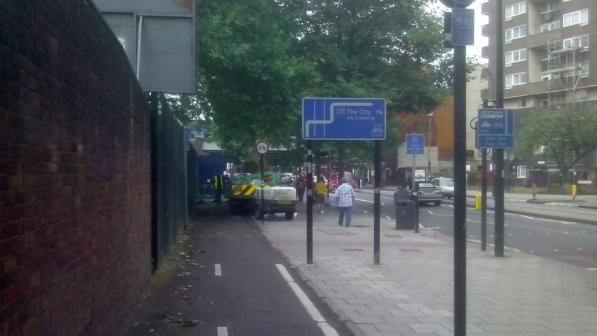Put an end to over-zealous fining in London

The Cyclists' Defence Fund (CDF) is supporting Kristian's appeal against his fine for pavement cycling as he exited the cycle track alongside London's New Kent Road to reach a pedestrian crossing. Watch Kristian's helmet camera footage of the incident.
While Kristian is pleased the Metropolitan Police have now agreed to put a stop to excessive fining at this location following his complaints, Kristian now wants to have not only his own fine annulled but also those of other cyclists fined for similarly trivial 'offences'. He believes it is not in the public interest to prosecute him, or others fined at this same location, not least because the cycle track itself is poorly designed and signed, creating legal uncertainty.
He also wants the Met to reconsider the priorities of its 'Operation Safeway' crackdown on driving and cycling offences - launched following a spate of 6 cyclist fatalities in November 2013 - to focus on evidence-based enforcement that targets the real dangers cyclists face.
CDF is appealing for funds to help Kristian fight his own fine, and to support CDF in its efforts to promote justice for cycling and cyclists. Please donate now.
Grounds for appeal
Kristian was fined by a Police and Community Support Officer (PCSO) taking part in Operation Safeway, a high-profile Met Police initiative aimed at improving both driver and cyclist safety following a spate of 6 cyclists' deaths in November 2013. However Kristian believes that fining cyclists for minor alleged legal breaches has nothing to do with improving cyclists' safety.
For one thing, the signing where Kristian was fined fails to show clearly where, if anywhere, cyclists are allowed to turn right from the cycle track to cross the road. Moreover, the crossing in question is a pelican rather than a toucan crossing - i.e. cyclists have no clear rights to use it either, despite the signing advising them to use it! Thirdly, the cycle track which Kristian allegedly strayed from is narrow, well below national design guidelines - there is even a phone box obstructing it at one point. Finally, if cyclists are required to turn tightly to reach the crossing, as the PCSO suggests he should have done, this would be a further breach of national design guidelines.
Alternatively, if Kristian did stray from the cycle track, this is at most a trivial breach of the rules (a 'de minimis' offence, in legal jargon), hence the PCSO should have exercised discretion in deciding whether to fine him, in accordance with advice from Ministers that fines for pavement cycling should not be issued to cyclists using pavements in a considerate manner for their own safety.
Despite showing consideration for all other users of the path, and in spite of instructions to 'use discretion', I was handed a fixed penalty notice for £50. I fail to see how this fine meets with the objective of the operation. I also believe that FPNs should serve some public interest, but what is the public interest in fining me for this?
Kristian Gregory
Kristian has been backed by Cllr Mark Williams, transport portfolio holder at Southwark Council. After Kristian's fine was issued, Southwark Council wrote to the Met and to Transport for London. In response, the local police and Boris Johnson's cycling commissioner Andrew Gilligan have both agreed to put an end to what Williams describes as "over zealous" policing at this location. However, Kristian's own fine has yet to be cancelled.
Help us fight Kristian's case and others like it.
Please donate now to support the Cyclists Defence Fund.
Rethinking police priorities
CDF has received several requests for advice about how to contest FPNs for pavement cycling since Operation Safeway resumed earlier this year.
Operation Safeway was intended to provide greater enforcement of cycle lanes, red traffic lights, advance stop lines (ASLs, or 'cycle boxes'), and careless cycling and driving more generally. CTC (of which CDF is a subsidiary charity), has broadly welcomed the crackdown on bad driving and vehicle offences, particularly the numbers of illegal lorries and lorry driving offences. However, both CTC and CDF have been concerned at what appears to be over-zealous targeting of cyclists, possibly to satisfy the public that the operation is "even-handed", or possibly to raise revenue.
Last November, CDF successfully challenged a fine issued to cyclist Alex Paxton for an alleged breach of an ASL which was blocked by a driver.
The same month, the Met Police were forced to deny a report in the Times last November suggesting that police officers taking part in Operation Safeway had been set quotas to fine 10 cyclists a month.
Responding to CTC following those claims, the Met emphasised that careless cycling, like careless driving, can result in death or serious injury. What they failed to account for is that cyclists are sometimes obliged to take actions that could be interpreted as 'careless cycling' to avoid dangerous situations.
CTC believes that all road users should respect the rules of the road and the safety of others, and we strongly advocate increased resources for roads policing. However, transgressions by cyclists are rarely a source of danger, either to themselves or to other road users, including pedestrians. The Met is ignoring the real threat to cyclists: unsafe drivers and vehicles.

